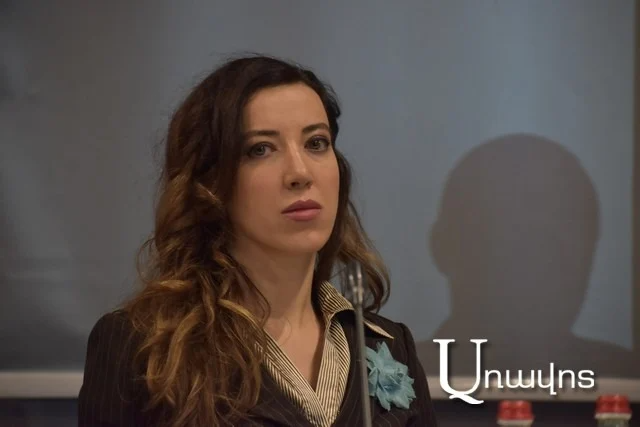According to human rights activist Siranuysh Sahakyan, she does not rule out the possibility of the European Court, understanding the over-politicization of the issue and Azerbaijan’s non-cooperative behavior, bringing the issue of the Armenian prisoners of war to the attention of its political body, which will put the appropriate pressure on Azerbaijan so that Azerbaijan can uphold some movement in returning prisoners of war.
Human rights activist, co-founder of the Path of Law NGO Siranuysh Sahakyan told Aravot Daily in an interview that she does not consider the return of a new group of prisoners of war to be realistic within a short period of time.
When asked if there are other female prisoners of war in Azerbaijan after the return of Maral Najarian, Siranuysh Sahakyan said that according to their data, there are three more Armenian female prisoners. When we asked how old they are and when they were captured, Siranuysh Sahakyan said, “According to our sources, there are three more Armenian female prisoners in Azerbaijan who are currently in captivity. However, Azerbaijan had only officially confirmed the capture of Maral, but it denies the capture of the three other women. Two of them were locals, and one was captured when she went back to Artsakh. The incident took place after the agreement was signed on November 9th. The other two ended up in territories under Azerbaijan’s control after those territories were occupied. They were residents of those territories. Since we know of cases where residents were not captured, but they were killed in separate incidents, we do not exclude the possibility of at least those two women having been killed, and that is why Azerbaijan denies allegations of their capture. They were elderly women. The third woman was also elderly.”
When asked if the statements made by representatives of the Armenian government that criticism against the government by the opposition is causing problems for the return of prisoners of war are founded, the human rights activist responded, “As a result of domestic political processes, there are speculations that have nothing to do with reality. It is a matter of interstate platforms where external factors have their influence. Domestic political issues cannot be a direct or decisive factor. By and large, having a weak state is a global factor, and the government is not able to solve interstate problems. In this respect, we are in a bad situation because we are the losing side, the country has not recovered yet, and we have weakened economically, militarily, and in other spheres. A weak state does not have the negotiating power to resolve interstate issues. I see issues in this respect that having a poor government and poor state deprive us of the ability to effectively resolve this issue on an international level. As far as the domestic developments taking place and the statements being made by political parties, those are not factors at all.”
Read also
Upon the observation that based on her statements, we are not in a hopeful situation, Siranush Sahakyan responded, “If we are to look at Armenia-Azerbaijan relations, then we are not in a hopeful situation. But if we discuss the possibility of these issues being resolved as a result of the involvement of another player, such as courts, international bodies, or influential countries, we will not consider the situation to be at a standstill, and we do have some positive expectations.”
When asked to clarify if there are positive expectations regarding the ECHR cases about the protection of the rights of prisoners of war, Siranuysh Sahakyan responded, “The ECHR is carrying out a legal process. In some cases, it is possible to also involve the European Parliament, which carries out political processes. I am referring to the council of ministers. We do not rule out the possibility that the court, understanding the over-politicization of the issue and Azerbaijan’s non-cooperative behavior, will bring the issue to the attention of its political body, and the political body will put the appropriate pressure on Azerbaijan to ensure the return of prisoners. We saw this take place in the Navalny case where the council of ministers was involved. I see such considerations at the moment. We have sent numerous letters, and the Office of the Plenipotentiary also sent similar letters. We also consider it realistic that the court will soon notify the council of ministers as well.”
Siranuysh Sahakyan noted that the return of another group of prisoners of war can only be expected when certain foreign policy issues are resolved; particularly, international pressure on Azerbaijan.
Tatev Harutyunyan






















































